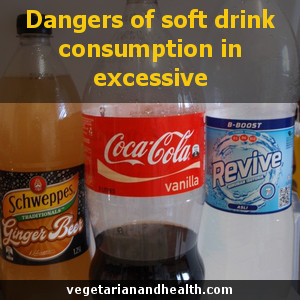 A soft drink is also called as soda drink, fizzy drink and carbonated drink. It is an artificial beverage not produced organically that contains carbonated water, a sweetener and a flavoring.
A soft drink is also called as soda drink, fizzy drink and carbonated drink. It is an artificial beverage not produced organically that contains carbonated water, a sweetener and a flavoring.
The sweetener may be sugar, high-fructose corn syrup, fruit juice, sugar substitutes if it is a diet drinks. Soft drinks may also contain caffeine, coloring, preservatives.
Health concerns and dangers of soft drink consumption in excessive:
The sugar-sweetened soft drinks consumption in excessive is associated with obesity, type 2 diabetes, dental caries, and low nutrient levels.
Obesity and weight-related diseases
Worldwide, humans have increased their consumption of sweetened beverages in the past decade and it has doubled the obesity level in the world. Obesity issue can be directly linked to the eating pattern of humans which consist of fast food, processed food and soft drinks. Humans have become too busy to prepare their own meal and looking for On-the-Go food most of the time.
Changes in consumption of soft drink can help predict changes in weight. The consumption of sugar-sweetened soft drinks can also be associated with many weight-related diseases, including type 2 diabetes, metabolic syndrome, cardiovascular risk factors and elevated blood pressure. [Source:http://en.wikipedia.org/wiki/Soft_drink]
Dental decay
Soft drinks contain high simple carbohydrates such as glucose, fructose, sucrose and other simple sugars. Oral bacteria ferment carbohydrates and produces acid, which dissolves tooth enamel during the dental decay process.
Sweetened drinks are likely to increase risk of dental caries if soft drinks are consumed excessively. Most of the soft drinks are acidic and drinking it for a long time can erode the tooth enamel.
Alternatively, drinking soft drink with a straw reduces contact with the teeth and can reduce the eroding of tooth enamel. Brushing teeth right after drinking soft drinks should be avoided as it increases chances of erosion to the teeth due to the presence of acid.
Bone density and bone loss
Drinking soft drinks in excessive correlates with a decrease in milk consumption along with the vitamin D, vitamin B6, vitamin B12, calcium, protein and other micro nutrients. Phosphorus is a micro nutrient which can be found in cola-type beverages and there is a risk in consuming too much of it.
Phosphorus and calcium are used in the body to create calcium-phosphate, which is the main component of bone. However, the combination of too much phosphorus with too little calcium in the body can lead to a degeneration of bone mass [Source:http://en.wikipedia.org/wiki/Soft_drink]
Young girls whom consume carbonated beverages excessively are at the risk of suffering fractures and low bone mineral density in the future.

